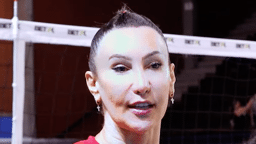In Hawaiian culture, the word “Mahu” is historically a third gender designation, and is now used as slang for “transgender” among Hawaiians. From the island of Maui, comes news of a new Mahu: a transgender student athlete, who reportedly is finding acceptance from her high school, her coaches and volleyball teammates.
So far, her only obstacle appears to be one bigoted coach, who refused to give his name to the newspaper reporting on her debut last week.
“In my opinion, it’s very irresponsible for the league to place these young women, who are minors, in an elevated level of risk.”
According to Maui News, the girl attends Kamehameha School in Maui, and while the report did not reveal her name or her age, it did say the athlete played for the KSM boys junior varsity volleyball team as a freshman in 2017.
She warmed up and was in uniform for the Warriors’ 25-14, 25-17, 27-25 win over Baldwin High School in the girls volleyball opener at Kaulaheanuiokamoku Gym one week ago today.
“I’m not going to say anything about our transgender athlete,” Kamehameha Maui Athletic Director Jon Viela said last Tuesday, reported the Maui News. Kamehameha Maui coach Alex Akana also declined comment following the match, as did the coach for Baldwin.
A Baldwin High administrator told the paper his school was aware of the situation going into Tuesday’s match. “We are OK with it,” the official said, and requested anonymity.
But one rival girls volleyball coach in the Maui Interscholastic League, who also asked the Maui News to withhold his name, said he wasn’t informed about the participation of a trans athlete before the season opened Tuesday night. He said his team wasn’t the only one left in the dark, and he feared for his girls’ safety.
“In my opinion, it’s very irresponsible for the league to place these young women, who are minors, in an elevated level of risk,” the unnamed coach told Maui News. Then he said he spoke for the parents who entrust their girls to him.
“They all sign off on an assumption of risk form for an understandable amount of risk. Now, there’s an elevated level of risk their daughters are going through and being put through without any notification to the parents at all.
“I have no problem with the kid being who (they) want to be, but now these girls are being put in an unsafe situation without giving the parents the opportunity to make an educated decision on whether they want their daughter in that position.”
How unsafe, exactly? The American Orthopaedic Society for Sports Medicine in Rosemont, Ill., says “volleyball injuries rank lowest for all major sports.” That said, volleyball players can of course incur both traumatic and overuse injuries.
“I don’t like to degrade women as thinking that they are weaker than men.”
Maui News reporter Robert Collias asked a transgender woman who transitioned as a youngster and played volleyball at Wahiawa Intermediate School on Oahu, to weigh in.
Tiare Sua defended the Kamehameha Maui student, and pushed back on the notion that males are necessarily stronger than females. Girls should not be underestimated, Sua said.
“I just want to say that, for me, I don’t compare females to males in that kind of strategy because I feel that females are stronger than men think,” said Sua, who is project coordinator for the Hawaii Empowered Alliance Reaching Transgender Services program at the Maui AIDS Foundation.
“I don’t like to degrade women as thinking that they are weaker than men,” she told Maui News. “Like, you would be surprised at how strong women are… To have somebody transgender or saying that somebody who’s trans is stronger than a female opponent, to me, is just biased.
“To me, females are strong, just the same… Women are not weak, they are strong beings.”
“This is kind of something new, so everybody’s learning,” Maui Interscholastic League Executive Director Joe Balangitao told the Maui News.
The Hawaii High School Athletic Association adopted its policy on transgender student-athletes in October 2017. HHSAA Executive Director Chris Chun called the policy — which he wrote — a work in progress.
“I wrote the policy about trying to be inclusive and letting student-athletes of all kinds of groups participate, which will make them feel comfortable,” Chun told the Maui News last week.
“I don’t feel comfortable getting into specifics or a specific sport, but safety is always a concern and competitive advantage is also a concern,” Chun said. “So even though we have a policy, it’s kind of like a guideline. It’s still in its early, early transition stages.”
You can read the policy by clicking here.







































